ICT Project Management Report: Methodology Selection and Evaluation
VerifiedAdded on 2021/04/19
|9
|1817
|531
Report
AI Summary
This report provides a detailed analysis of ICT project management methodologies, specifically comparing and contrasting PRINCE2 and PMBOK. The report begins by defining project methodology and its critical evaluation, drawing upon various authors' definitions and emphasizing its role in project management. The core of the report involves a comparative study of PRINCE2 and PMBOK, highlighting their similarities, such as providing solutions to project problems and aiding in risk identification, and their differences, including complexity and approach to project control. The report also evaluates the role of PRINCE2 in the Project Life Cycle (PLC), demonstrating its applicability across different stages of project management. The report concludes that PRINCE2 methodology is a flexible approach to guide a project towards success.
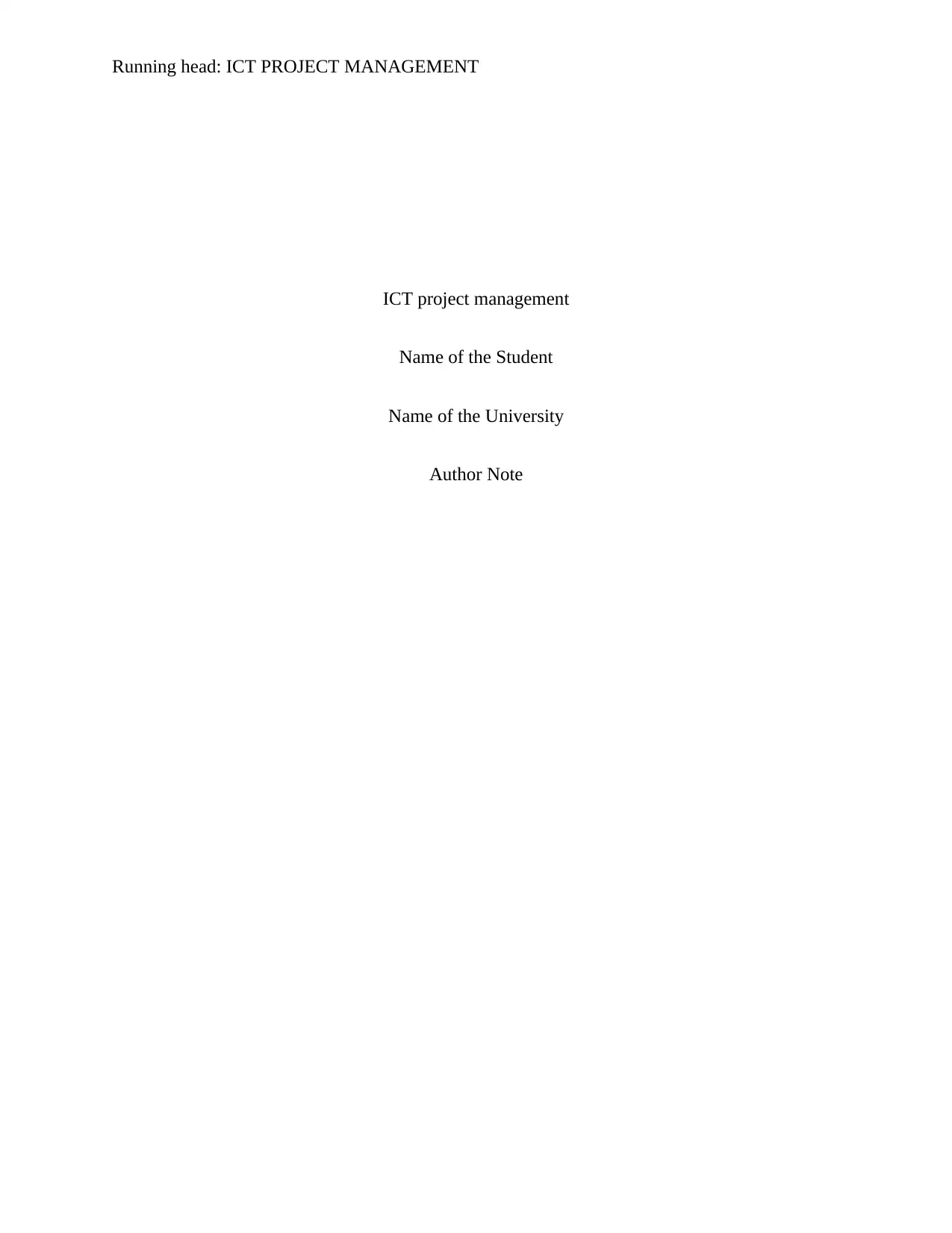
Running head: ICT PROJECT MANAGEMENT
ICT project management
Name of the Student
Name of the University
Author Note
ICT project management
Name of the Student
Name of the University
Author Note
Paraphrase This Document
Need a fresh take? Get an instant paraphrase of this document with our AI Paraphraser
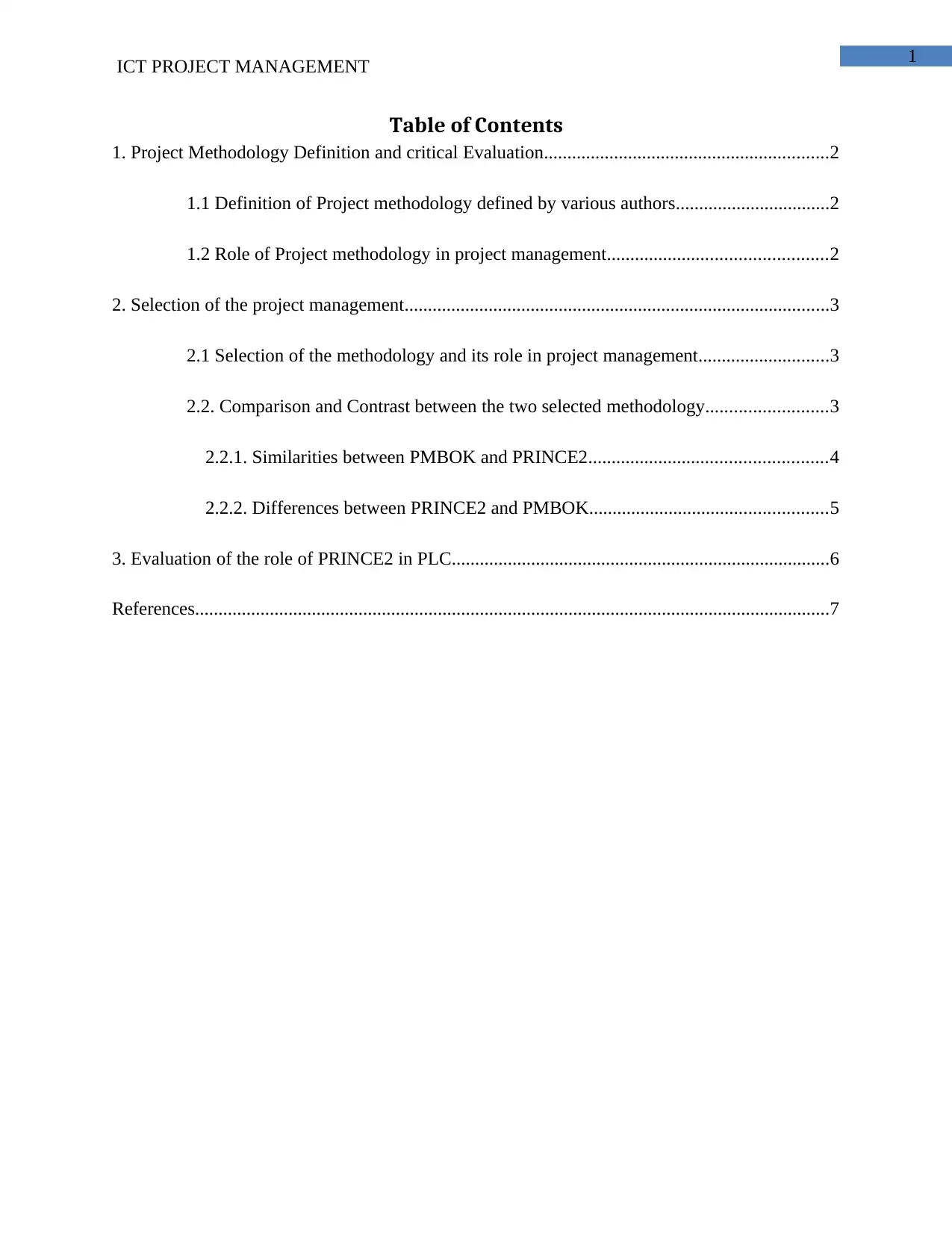
1
ICT PROJECT MANAGEMENT
Table of Contents
1. Project Methodology Definition and critical Evaluation.............................................................2
1.1 Definition of Project methodology defined by various authors.................................2
1.2 Role of Project methodology in project management...............................................2
2. Selection of the project management...........................................................................................3
2.1 Selection of the methodology and its role in project management............................3
2.2. Comparison and Contrast between the two selected methodology..........................3
2.2.1. Similarities between PMBOK and PRINCE2...................................................4
2.2.2. Differences between PRINCE2 and PMBOK...................................................5
3. Evaluation of the role of PRINCE2 in PLC.................................................................................6
References........................................................................................................................................7
ICT PROJECT MANAGEMENT
Table of Contents
1. Project Methodology Definition and critical Evaluation.............................................................2
1.1 Definition of Project methodology defined by various authors.................................2
1.2 Role of Project methodology in project management...............................................2
2. Selection of the project management...........................................................................................3
2.1 Selection of the methodology and its role in project management............................3
2.2. Comparison and Contrast between the two selected methodology..........................3
2.2.1. Similarities between PMBOK and PRINCE2...................................................4
2.2.2. Differences between PRINCE2 and PMBOK...................................................5
3. Evaluation of the role of PRINCE2 in PLC.................................................................................6
References........................................................................................................................................7
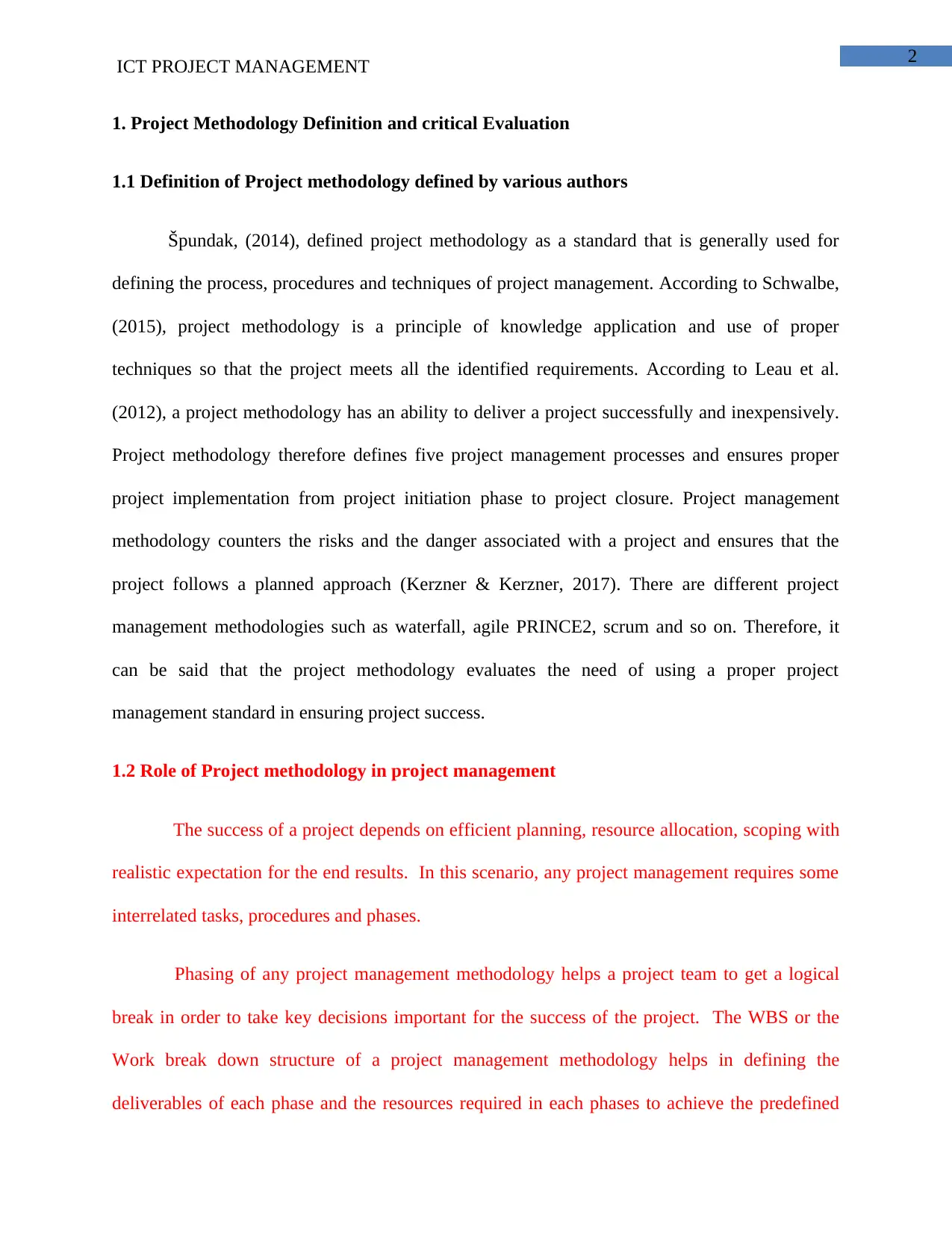
2
ICT PROJECT MANAGEMENT
1. Project Methodology Definition and critical Evaluation
1.1 Definition of Project methodology defined by various authors
Špundak, (2014), defined project methodology as a standard that is generally used for
defining the process, procedures and techniques of project management. According to Schwalbe,
(2015), project methodology is a principle of knowledge application and use of proper
techniques so that the project meets all the identified requirements. According to Leau et al.
(2012), a project methodology has an ability to deliver a project successfully and inexpensively.
Project methodology therefore defines five project management processes and ensures proper
project implementation from project initiation phase to project closure. Project management
methodology counters the risks and the danger associated with a project and ensures that the
project follows a planned approach (Kerzner & Kerzner, 2017). There are different project
management methodologies such as waterfall, agile PRINCE2, scrum and so on. Therefore, it
can be said that the project methodology evaluates the need of using a proper project
management standard in ensuring project success.
1.2 Role of Project methodology in project management
The success of a project depends on efficient planning, resource allocation, scoping with
realistic expectation for the end results. In this scenario, any project management requires some
interrelated tasks, procedures and phases.
Phasing of any project management methodology helps a project team to get a logical
break in order to take key decisions important for the success of the project. The WBS or the
Work break down structure of a project management methodology helps in defining the
deliverables of each phase and the resources required in each phases to achieve the predefined
ICT PROJECT MANAGEMENT
1. Project Methodology Definition and critical Evaluation
1.1 Definition of Project methodology defined by various authors
Špundak, (2014), defined project methodology as a standard that is generally used for
defining the process, procedures and techniques of project management. According to Schwalbe,
(2015), project methodology is a principle of knowledge application and use of proper
techniques so that the project meets all the identified requirements. According to Leau et al.
(2012), a project methodology has an ability to deliver a project successfully and inexpensively.
Project methodology therefore defines five project management processes and ensures proper
project implementation from project initiation phase to project closure. Project management
methodology counters the risks and the danger associated with a project and ensures that the
project follows a planned approach (Kerzner & Kerzner, 2017). There are different project
management methodologies such as waterfall, agile PRINCE2, scrum and so on. Therefore, it
can be said that the project methodology evaluates the need of using a proper project
management standard in ensuring project success.
1.2 Role of Project methodology in project management
The success of a project depends on efficient planning, resource allocation, scoping with
realistic expectation for the end results. In this scenario, any project management requires some
interrelated tasks, procedures and phases.
Phasing of any project management methodology helps a project team to get a logical
break in order to take key decisions important for the success of the project. The WBS or the
Work break down structure of a project management methodology helps in defining the
deliverables of each phase and the resources required in each phases to achieve the predefined
⊘ This is a preview!⊘
Do you want full access?
Subscribe today to unlock all pages.

Trusted by 1+ million students worldwide
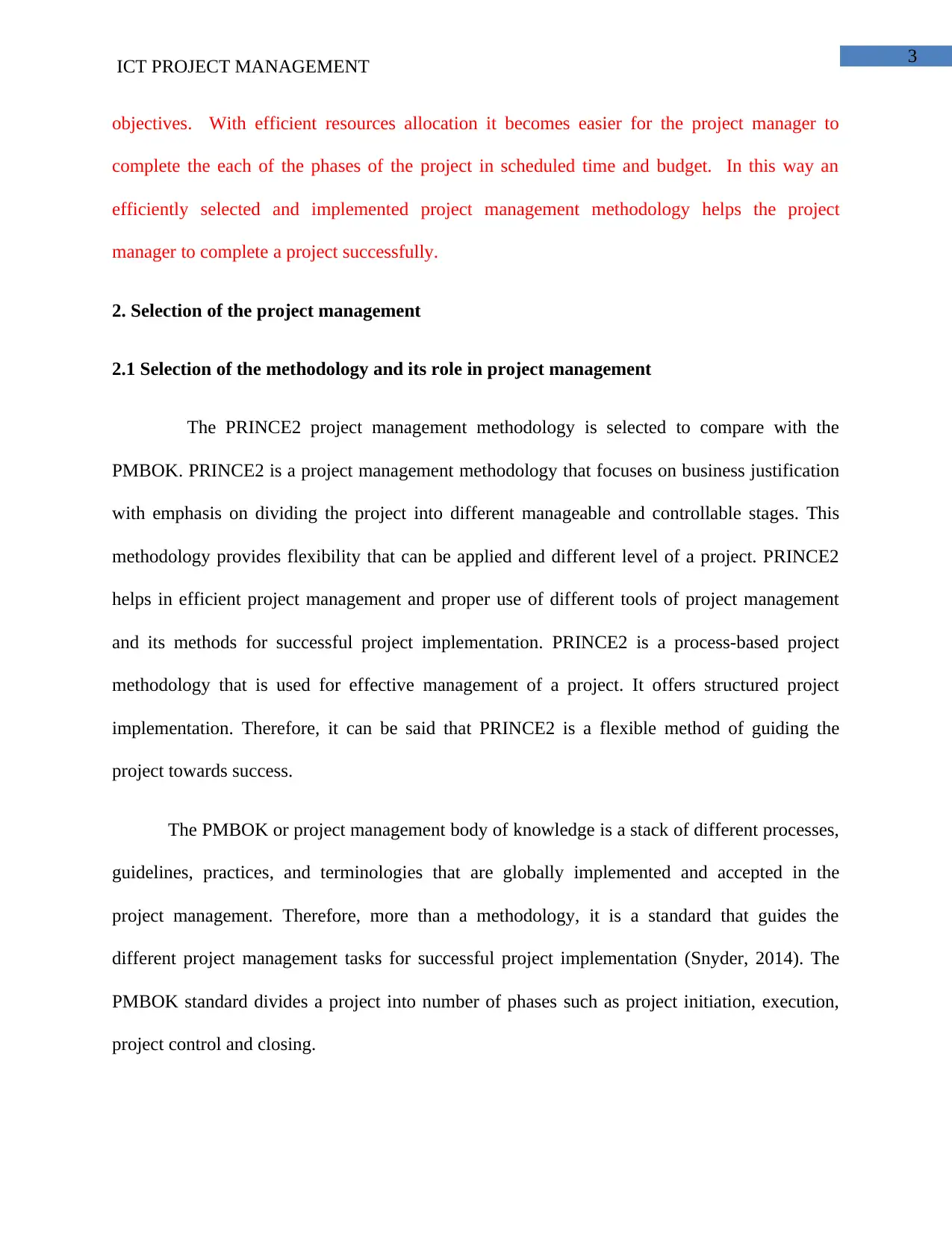
3
ICT PROJECT MANAGEMENT
objectives. With efficient resources allocation it becomes easier for the project manager to
complete the each of the phases of the project in scheduled time and budget. In this way an
efficiently selected and implemented project management methodology helps the project
manager to complete a project successfully.
2. Selection of the project management
2.1 Selection of the methodology and its role in project management
The PRINCE2 project management methodology is selected to compare with the
PMBOK. PRINCE2 is a project management methodology that focuses on business justification
with emphasis on dividing the project into different manageable and controllable stages. This
methodology provides flexibility that can be applied and different level of a project. PRINCE2
helps in efficient project management and proper use of different tools of project management
and its methods for successful project implementation. PRINCE2 is a process-based project
methodology that is used for effective management of a project. It offers structured project
implementation. Therefore, it can be said that PRINCE2 is a flexible method of guiding the
project towards success.
The PMBOK or project management body of knowledge is a stack of different processes,
guidelines, practices, and terminologies that are globally implemented and accepted in the
project management. Therefore, more than a methodology, it is a standard that guides the
different project management tasks for successful project implementation (Snyder, 2014). The
PMBOK standard divides a project into number of phases such as project initiation, execution,
project control and closing.
ICT PROJECT MANAGEMENT
objectives. With efficient resources allocation it becomes easier for the project manager to
complete the each of the phases of the project in scheduled time and budget. In this way an
efficiently selected and implemented project management methodology helps the project
manager to complete a project successfully.
2. Selection of the project management
2.1 Selection of the methodology and its role in project management
The PRINCE2 project management methodology is selected to compare with the
PMBOK. PRINCE2 is a project management methodology that focuses on business justification
with emphasis on dividing the project into different manageable and controllable stages. This
methodology provides flexibility that can be applied and different level of a project. PRINCE2
helps in efficient project management and proper use of different tools of project management
and its methods for successful project implementation. PRINCE2 is a process-based project
methodology that is used for effective management of a project. It offers structured project
implementation. Therefore, it can be said that PRINCE2 is a flexible method of guiding the
project towards success.
The PMBOK or project management body of knowledge is a stack of different processes,
guidelines, practices, and terminologies that are globally implemented and accepted in the
project management. Therefore, more than a methodology, it is a standard that guides the
different project management tasks for successful project implementation (Snyder, 2014). The
PMBOK standard divides a project into number of phases such as project initiation, execution,
project control and closing.
Paraphrase This Document
Need a fresh take? Get an instant paraphrase of this document with our AI Paraphraser
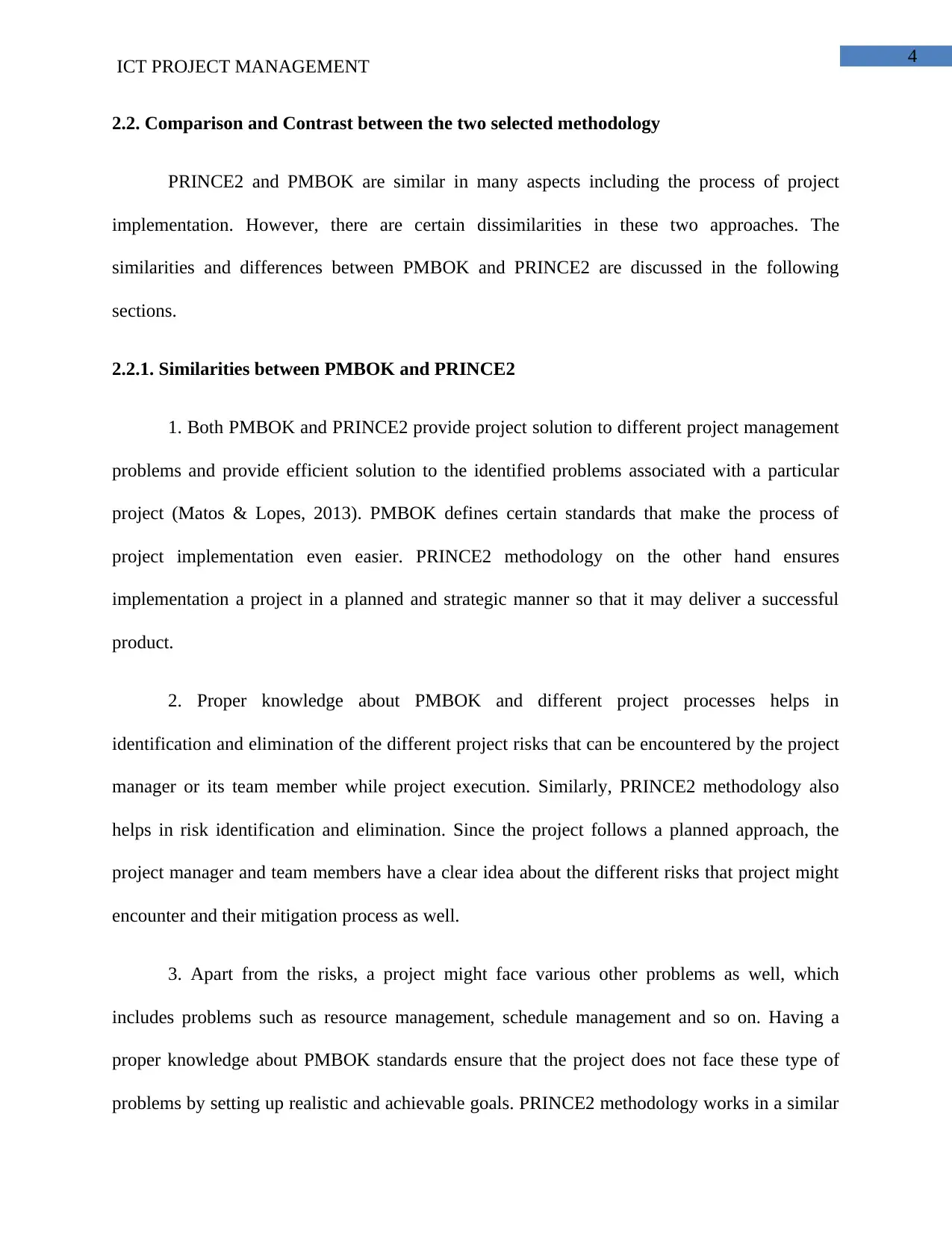
4
ICT PROJECT MANAGEMENT
2.2. Comparison and Contrast between the two selected methodology
PRINCE2 and PMBOK are similar in many aspects including the process of project
implementation. However, there are certain dissimilarities in these two approaches. The
similarities and differences between PMBOK and PRINCE2 are discussed in the following
sections.
2.2.1. Similarities between PMBOK and PRINCE2
1. Both PMBOK and PRINCE2 provide project solution to different project management
problems and provide efficient solution to the identified problems associated with a particular
project (Matos & Lopes, 2013). PMBOK defines certain standards that make the process of
project implementation even easier. PRINCE2 methodology on the other hand ensures
implementation a project in a planned and strategic manner so that it may deliver a successful
product.
2. Proper knowledge about PMBOK and different project processes helps in
identification and elimination of the different project risks that can be encountered by the project
manager or its team member while project execution. Similarly, PRINCE2 methodology also
helps in risk identification and elimination. Since the project follows a planned approach, the
project manager and team members have a clear idea about the different risks that project might
encounter and their mitigation process as well.
3. Apart from the risks, a project might face various other problems as well, which
includes problems such as resource management, schedule management and so on. Having a
proper knowledge about PMBOK standards ensure that the project does not face these type of
problems by setting up realistic and achievable goals. PRINCE2 methodology works in a similar
ICT PROJECT MANAGEMENT
2.2. Comparison and Contrast between the two selected methodology
PRINCE2 and PMBOK are similar in many aspects including the process of project
implementation. However, there are certain dissimilarities in these two approaches. The
similarities and differences between PMBOK and PRINCE2 are discussed in the following
sections.
2.2.1. Similarities between PMBOK and PRINCE2
1. Both PMBOK and PRINCE2 provide project solution to different project management
problems and provide efficient solution to the identified problems associated with a particular
project (Matos & Lopes, 2013). PMBOK defines certain standards that make the process of
project implementation even easier. PRINCE2 methodology on the other hand ensures
implementation a project in a planned and strategic manner so that it may deliver a successful
product.
2. Proper knowledge about PMBOK and different project processes helps in
identification and elimination of the different project risks that can be encountered by the project
manager or its team member while project execution. Similarly, PRINCE2 methodology also
helps in risk identification and elimination. Since the project follows a planned approach, the
project manager and team members have a clear idea about the different risks that project might
encounter and their mitigation process as well.
3. Apart from the risks, a project might face various other problems as well, which
includes problems such as resource management, schedule management and so on. Having a
proper knowledge about PMBOK standards ensure that the project does not face these type of
problems by setting up realistic and achievable goals. PRINCE2 methodology works in a similar
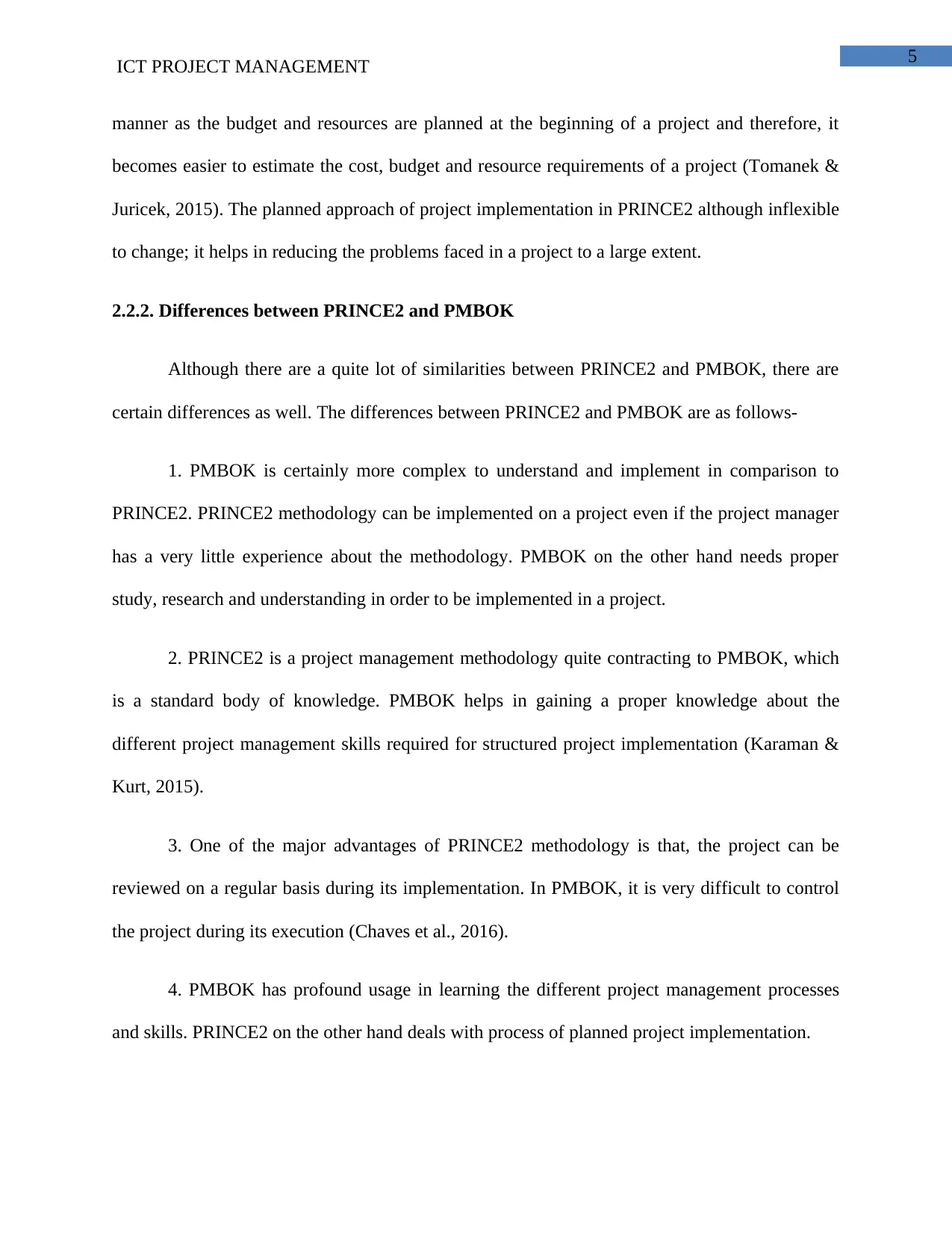
5
ICT PROJECT MANAGEMENT
manner as the budget and resources are planned at the beginning of a project and therefore, it
becomes easier to estimate the cost, budget and resource requirements of a project (Tomanek &
Juricek, 2015). The planned approach of project implementation in PRINCE2 although inflexible
to change; it helps in reducing the problems faced in a project to a large extent.
2.2.2. Differences between PRINCE2 and PMBOK
Although there are a quite lot of similarities between PRINCE2 and PMBOK, there are
certain differences as well. The differences between PRINCE2 and PMBOK are as follows-
1. PMBOK is certainly more complex to understand and implement in comparison to
PRINCE2. PRINCE2 methodology can be implemented on a project even if the project manager
has a very little experience about the methodology. PMBOK on the other hand needs proper
study, research and understanding in order to be implemented in a project.
2. PRINCE2 is a project management methodology quite contracting to PMBOK, which
is a standard body of knowledge. PMBOK helps in gaining a proper knowledge about the
different project management skills required for structured project implementation (Karaman &
Kurt, 2015).
3. One of the major advantages of PRINCE2 methodology is that, the project can be
reviewed on a regular basis during its implementation. In PMBOK, it is very difficult to control
the project during its execution (Chaves et al., 2016).
4. PMBOK has profound usage in learning the different project management processes
and skills. PRINCE2 on the other hand deals with process of planned project implementation.
ICT PROJECT MANAGEMENT
manner as the budget and resources are planned at the beginning of a project and therefore, it
becomes easier to estimate the cost, budget and resource requirements of a project (Tomanek &
Juricek, 2015). The planned approach of project implementation in PRINCE2 although inflexible
to change; it helps in reducing the problems faced in a project to a large extent.
2.2.2. Differences between PRINCE2 and PMBOK
Although there are a quite lot of similarities between PRINCE2 and PMBOK, there are
certain differences as well. The differences between PRINCE2 and PMBOK are as follows-
1. PMBOK is certainly more complex to understand and implement in comparison to
PRINCE2. PRINCE2 methodology can be implemented on a project even if the project manager
has a very little experience about the methodology. PMBOK on the other hand needs proper
study, research and understanding in order to be implemented in a project.
2. PRINCE2 is a project management methodology quite contracting to PMBOK, which
is a standard body of knowledge. PMBOK helps in gaining a proper knowledge about the
different project management skills required for structured project implementation (Karaman &
Kurt, 2015).
3. One of the major advantages of PRINCE2 methodology is that, the project can be
reviewed on a regular basis during its implementation. In PMBOK, it is very difficult to control
the project during its execution (Chaves et al., 2016).
4. PMBOK has profound usage in learning the different project management processes
and skills. PRINCE2 on the other hand deals with process of planned project implementation.
⊘ This is a preview!⊘
Do you want full access?
Subscribe today to unlock all pages.

Trusted by 1+ million students worldwide
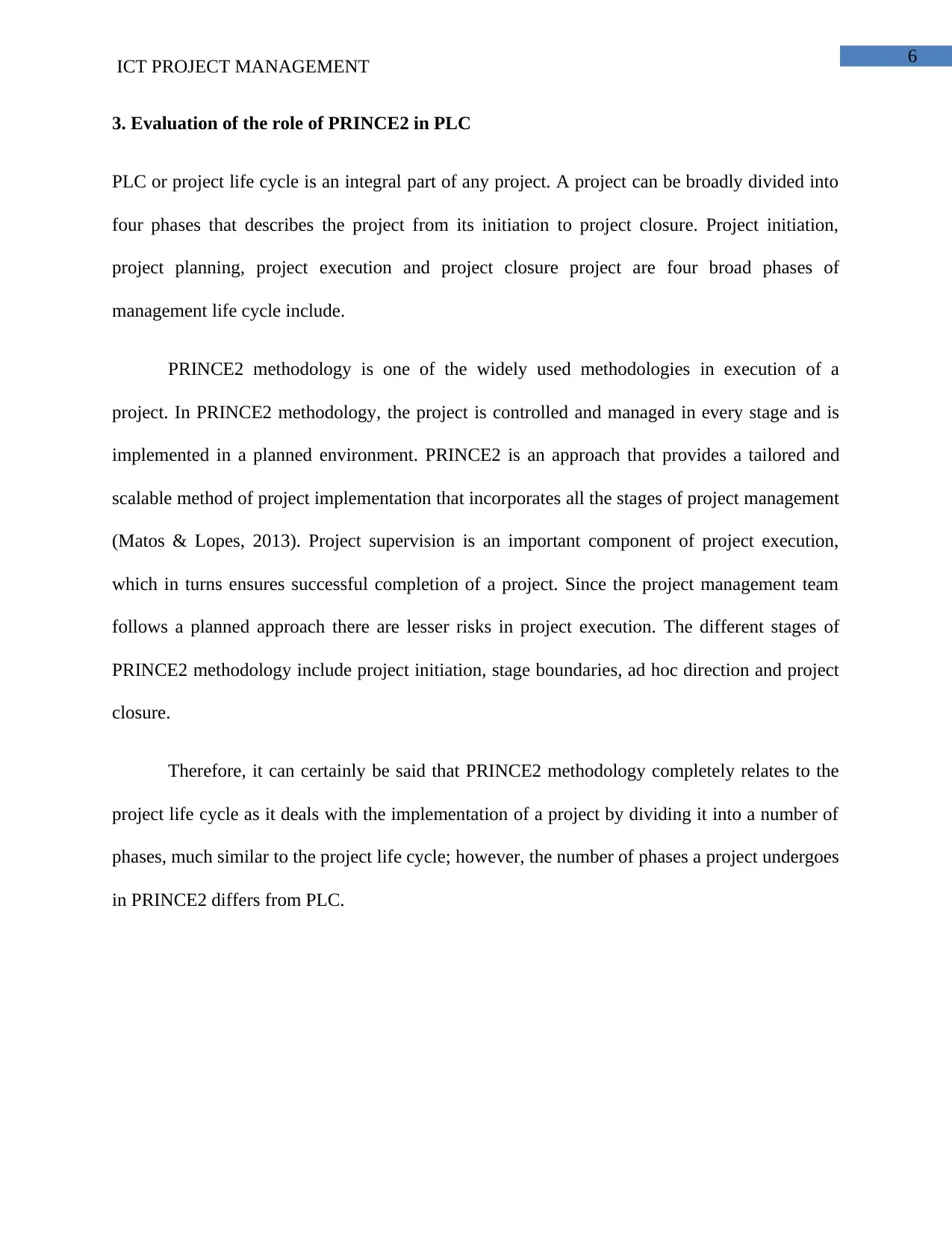
6
ICT PROJECT MANAGEMENT
3. Evaluation of the role of PRINCE2 in PLC
PLC or project life cycle is an integral part of any project. A project can be broadly divided into
four phases that describes the project from its initiation to project closure. Project initiation,
project planning, project execution and project closure project are four broad phases of
management life cycle include.
PRINCE2 methodology is one of the widely used methodologies in execution of a
project. In PRINCE2 methodology, the project is controlled and managed in every stage and is
implemented in a planned environment. PRINCE2 is an approach that provides a tailored and
scalable method of project implementation that incorporates all the stages of project management
(Matos & Lopes, 2013). Project supervision is an important component of project execution,
which in turns ensures successful completion of a project. Since the project management team
follows a planned approach there are lesser risks in project execution. The different stages of
PRINCE2 methodology include project initiation, stage boundaries, ad hoc direction and project
closure.
Therefore, it can certainly be said that PRINCE2 methodology completely relates to the
project life cycle as it deals with the implementation of a project by dividing it into a number of
phases, much similar to the project life cycle; however, the number of phases a project undergoes
in PRINCE2 differs from PLC.
ICT PROJECT MANAGEMENT
3. Evaluation of the role of PRINCE2 in PLC
PLC or project life cycle is an integral part of any project. A project can be broadly divided into
four phases that describes the project from its initiation to project closure. Project initiation,
project planning, project execution and project closure project are four broad phases of
management life cycle include.
PRINCE2 methodology is one of the widely used methodologies in execution of a
project. In PRINCE2 methodology, the project is controlled and managed in every stage and is
implemented in a planned environment. PRINCE2 is an approach that provides a tailored and
scalable method of project implementation that incorporates all the stages of project management
(Matos & Lopes, 2013). Project supervision is an important component of project execution,
which in turns ensures successful completion of a project. Since the project management team
follows a planned approach there are lesser risks in project execution. The different stages of
PRINCE2 methodology include project initiation, stage boundaries, ad hoc direction and project
closure.
Therefore, it can certainly be said that PRINCE2 methodology completely relates to the
project life cycle as it deals with the implementation of a project by dividing it into a number of
phases, much similar to the project life cycle; however, the number of phases a project undergoes
in PRINCE2 differs from PLC.
Paraphrase This Document
Need a fresh take? Get an instant paraphrase of this document with our AI Paraphraser
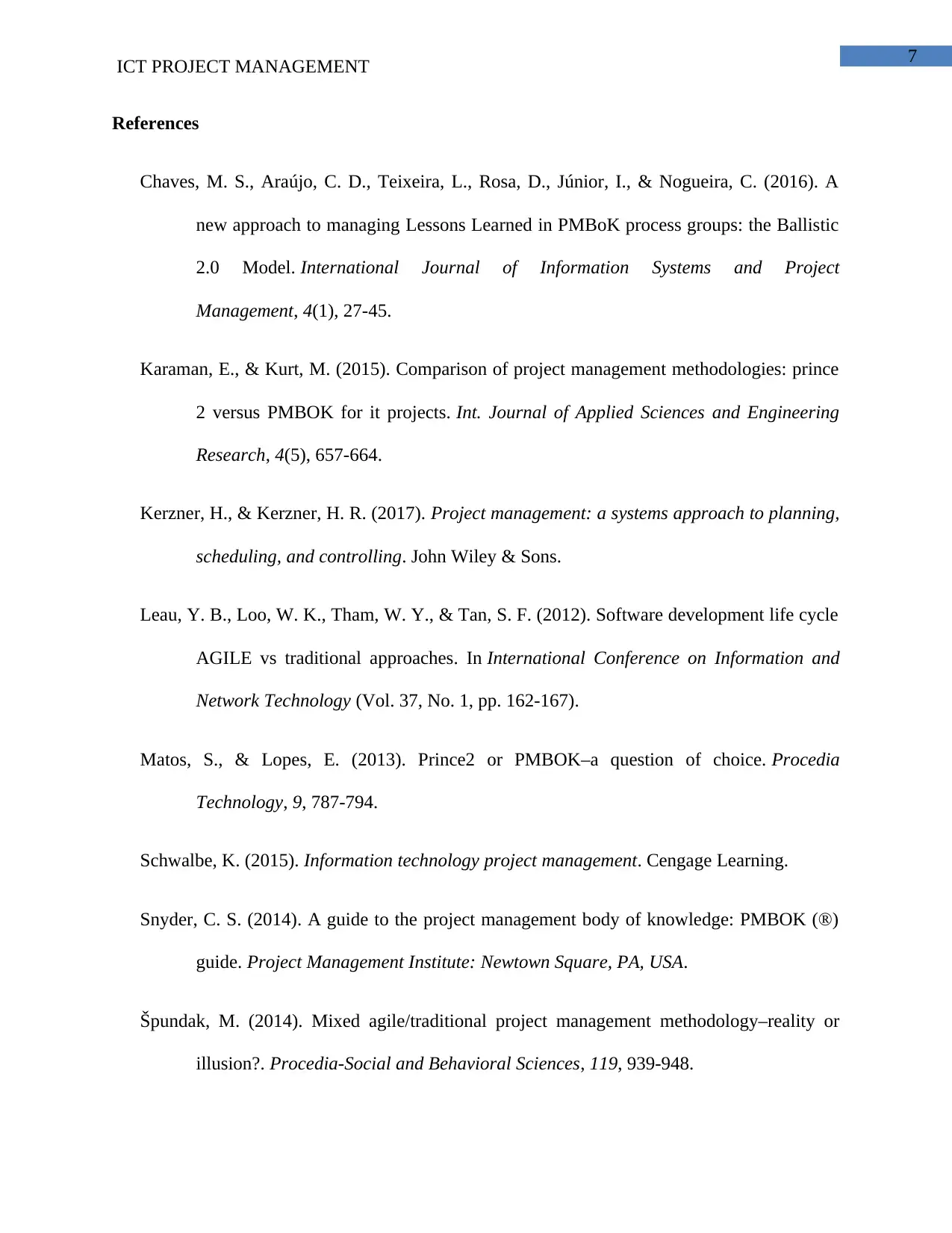
7
ICT PROJECT MANAGEMENT
References
Chaves, M. S., Araújo, C. D., Teixeira, L., Rosa, D., Júnior, I., & Nogueira, C. (2016). A
new approach to managing Lessons Learned in PMBoK process groups: the Ballistic
2.0 Model. International Journal of Information Systems and Project
Management, 4(1), 27-45.
Karaman, E., & Kurt, M. (2015). Comparison of project management methodologies: prince
2 versus PMBOK for it projects. Int. Journal of Applied Sciences and Engineering
Research, 4(5), 657-664.
Kerzner, H., & Kerzner, H. R. (2017). Project management: a systems approach to planning,
scheduling, and controlling. John Wiley & Sons.
Leau, Y. B., Loo, W. K., Tham, W. Y., & Tan, S. F. (2012). Software development life cycle
AGILE vs traditional approaches. In International Conference on Information and
Network Technology (Vol. 37, No. 1, pp. 162-167).
Matos, S., & Lopes, E. (2013). Prince2 or PMBOK–a question of choice. Procedia
Technology, 9, 787-794.
Schwalbe, K. (2015). Information technology project management. Cengage Learning.
Snyder, C. S. (2014). A guide to the project management body of knowledge: PMBOK (®)
guide. Project Management Institute: Newtown Square, PA, USA.
Špundak, M. (2014). Mixed agile/traditional project management methodology–reality or
illusion?. Procedia-Social and Behavioral Sciences, 119, 939-948.
ICT PROJECT MANAGEMENT
References
Chaves, M. S., Araújo, C. D., Teixeira, L., Rosa, D., Júnior, I., & Nogueira, C. (2016). A
new approach to managing Lessons Learned in PMBoK process groups: the Ballistic
2.0 Model. International Journal of Information Systems and Project
Management, 4(1), 27-45.
Karaman, E., & Kurt, M. (2015). Comparison of project management methodologies: prince
2 versus PMBOK for it projects. Int. Journal of Applied Sciences and Engineering
Research, 4(5), 657-664.
Kerzner, H., & Kerzner, H. R. (2017). Project management: a systems approach to planning,
scheduling, and controlling. John Wiley & Sons.
Leau, Y. B., Loo, W. K., Tham, W. Y., & Tan, S. F. (2012). Software development life cycle
AGILE vs traditional approaches. In International Conference on Information and
Network Technology (Vol. 37, No. 1, pp. 162-167).
Matos, S., & Lopes, E. (2013). Prince2 or PMBOK–a question of choice. Procedia
Technology, 9, 787-794.
Schwalbe, K. (2015). Information technology project management. Cengage Learning.
Snyder, C. S. (2014). A guide to the project management body of knowledge: PMBOK (®)
guide. Project Management Institute: Newtown Square, PA, USA.
Špundak, M. (2014). Mixed agile/traditional project management methodology–reality or
illusion?. Procedia-Social and Behavioral Sciences, 119, 939-948.

8
ICT PROJECT MANAGEMENT
Tomanek, M., & Juricek, J. (2015). Project risk management model based on PRINCE2 and
SCRUM frameworks. arXiv preprint arXiv:1502.03595.
ICT PROJECT MANAGEMENT
Tomanek, M., & Juricek, J. (2015). Project risk management model based on PRINCE2 and
SCRUM frameworks. arXiv preprint arXiv:1502.03595.
⊘ This is a preview!⊘
Do you want full access?
Subscribe today to unlock all pages.

Trusted by 1+ million students worldwide
1 out of 9
Related Documents
Your All-in-One AI-Powered Toolkit for Academic Success.
+13062052269
info@desklib.com
Available 24*7 on WhatsApp / Email
![[object Object]](/_next/static/media/star-bottom.7253800d.svg)
Unlock your academic potential
Copyright © 2020–2026 A2Z Services. All Rights Reserved. Developed and managed by ZUCOL.





